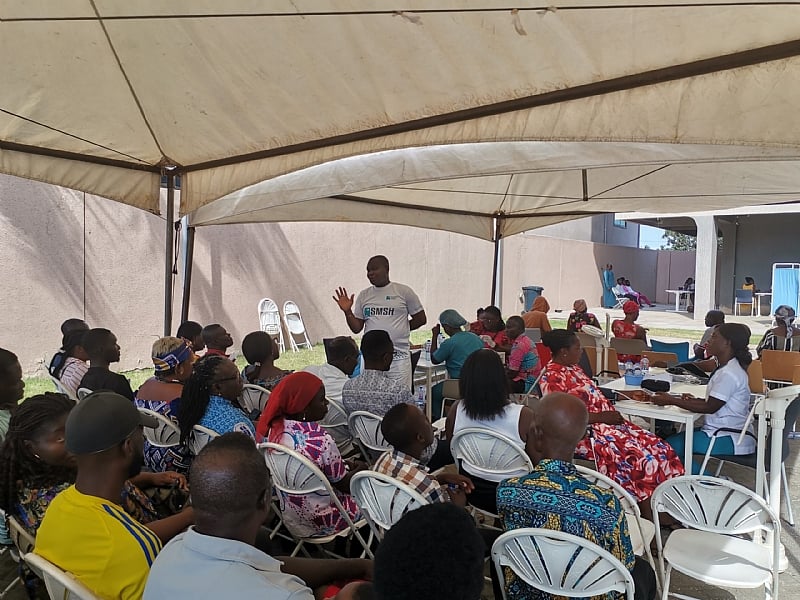Dr. Lawrence Agyeman Sereboe, the Medical Director of St. Michael’s Specialist Hospital in Accra, emphasized the critical role of healthy lifestyles in preventing cardiovascular diseases during the World Heart Day Campaign and Free Cardiac Screening Event. He articulated that simple changes in daily habits—such as engaging in regular medical check-ups, exercising routinely, and consuming a diet rich in fruits and vegetables—can significantly lower the risks of diseases like obesity, hypertension, and diabetes. This event was integral to raising awareness about cardiovascular health and the importance of early disease detection, which aligns with the global observance of World Heart Day on September 29 each year. Established in 2000 through a partnership between the World Heart Federation and the World Health Organization, this day aims to highlight the increasing prevalence of cardiovascular diseases and the necessary actions individuals can take to combat them.
Dr. Sereboe pointed out that an alarming 80% of heart diseases and strokes can be prevented with straightforward lifestyle modifications. He reassured attendees that having a condition like hypertension does not equate to a fatalistic outcome; individuals can take proactive steps to manage their health effectively. He urged patients dealing with diabetes and high blood pressure to make regular visits to healthcare facilities for check-ups and adhere closely to their prescribed medication regimens. This preventative approach emphasizes the notion that while certain health risks are present, there are actionable ways to mitigate them, enhancing overall health outcomes.
Furthermore, Dr. Sereboe issued a warning against detrimental habits, such as smoking and excessive alcohol consumption, which are recognized as significant contributors to heart attacks and strokes. He drew attention to the dangerous equivalences of smoking, stating that one hour spent smoking shisha could be as harmful as smoking 100 cigarettes. His message is particularly pertinent for young individuals, as he noted that quitting smoking could dramatically decrease the risk of heart attacks over time. The encouragement to cultivate healthier lifestyles was highlighted as a vital prevention strategy, reinforcing the idea that the path to better heart health begins with informed personal choices.
The World Heart Day event also served as a platform for community engagement, exemplified by the positive feedback from participants. Madam Araba Tweba, a beneficiary of the health screening, shared her appreciation for the initiative, noting it provided a valuable opportunity for individuals who might not routinely seek medical care to learn about their health status. Other beneficiaries, including Mr. Ezekiel Ackom and Jiu-jitsu, echoed similar sentiments, acknowledging the smooth and educational nature of the screening process. Their commitment to adhering to medical advice is a testament to the event’s success in promoting awareness and encouraging community engagement in health management.
This proactive approach to health resonates deeply within the context of prevailing public health challenges, particularly those related to non-communicable diseases. With the increasing incidence of cardiovascular diseases globally, initiatives like the World Heart Day Campaign are essential for fostering a culture of health consciousness. They not only educate the public on the risks associated with unhealthy lifestyles but also provide accessible resources for individuals to take charge of their personal health and well-being. The integration of screening services further enhances this effort by facilitating early detection and intervention, which are critical components in managing and preventing serious health conditions.
In conclusion, Dr. Sereboe’s insights during the World Heart Day Campaign underline the significance of healthy lifestyle choices in combating cardiovascular diseases. His call to action for regular health check-ups, a balanced diet, and the avoidance of harmful substances serves as a crucial reminder of the power individuals have in safeguarding their health. The successful outreach event at St. Michael’s Specialist Hospital not only exemplified community-centered healthcare but also illustrated the importance of education and support in promoting healthier lifestyles. As awareness grows and individuals commit to positive changes, the potential to reduce the burden of cardiovascular diseases becomes increasingly attainable, reinforcing the theme of this year’s World Heart Day: “Use Heart for Action.”


